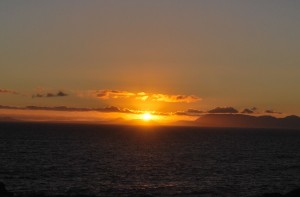 There < can be no doubt that we are living in a time of unprecedented change and I don't know about you, but I can feel the energy! We are manifesting all the anxiety, restlessness and disruption of a civilisation in the throes of a great change. And interestingly, this change, which many believe has epochal significance, has been prophesied by many diverse wisdom teachings and major religious belief systems around the world.
For example Buddhists believe that the Wheel of Dharma, which takes an infusion of energy in the form of a paradigm shift every 500 years throughout its 2500 year cycle, has once again come to an end signalling a new beginning or rebirth for humanity, with Man as being divine in nature, being the paradigm shift.
In the Islamic tradition Al-Qiyamah (The Resurrection), which is considered a fundamental tenet of faith by all Muslims, is a time of judgement and resurrection. Some Muslims construe the signs of Quiyamah as unfolding in these first decades of the millennium.
There < can be no doubt that we are living in a time of unprecedented change and I don't know about you, but I can feel the energy! We are manifesting all the anxiety, restlessness and disruption of a civilisation in the throes of a great change. And interestingly, this change, which many believe has epochal significance, has been prophesied by many diverse wisdom teachings and major religious belief systems around the world.
For example Buddhists believe that the Wheel of Dharma, which takes an infusion of energy in the form of a paradigm shift every 500 years throughout its 2500 year cycle, has once again come to an end signalling a new beginning or rebirth for humanity, with Man as being divine in nature, being the paradigm shift.
In the Islamic tradition Al-Qiyamah (The Resurrection), which is considered a fundamental tenet of faith by all Muslims, is a time of judgement and resurrection. Some Muslims construe the signs of Quiyamah as unfolding in these first decades of the millennium.
 In the Indian tradition we are now in Krita Yuga (the age of transition), coming out of Kali Yuga (the age of darkness and ignorance) and being on the verge of entering Satya Yuga (the age of truth). According to the Mayan calendar we are in the Sixth Night of the Galactic Underworld before the onset of the Seventh Day on November 3, 2010, with October 28, 2011, signalling the completion date of the cosmic plan. And from a Western astrological perspective we are transitioning from the Age of Pisces to the Age of Aquarius, a time of greater joy and positivity which also signals a rebirth and spiritual awakening.
In the Indian tradition we are now in Krita Yuga (the age of transition), coming out of Kali Yuga (the age of darkness and ignorance) and being on the verge of entering Satya Yuga (the age of truth). According to the Mayan calendar we are in the Sixth Night of the Galactic Underworld before the onset of the Seventh Day on November 3, 2010, with October 28, 2011, signalling the completion date of the cosmic plan. And from a Western astrological perspective we are transitioning from the Age of Pisces to the Age of Aquarius, a time of greater joy and positivity which also signals a rebirth and spiritual awakening.
As great shifts and tides shape a new global reality we can expect great upheaval. However, this transition is also likely to bring great positives as for many people it will intersect with a personal shift from a left-brain emphasis on rationality and the purely material, to an inclusion of right-brain creativity and intuition.
This will merge the two spheres or hemispheres of the self, uniting values of authority, dominance, control and rationality with those of consultation, persuasion, influence and insight, resulting in a new wholeness and a greater understanding of our part in the living world.
It will also hopefully move us away from the separatist and reductionist approach which characterised previous eras towards a new paradigm that stresses interconnection and interdependence with the natural world.